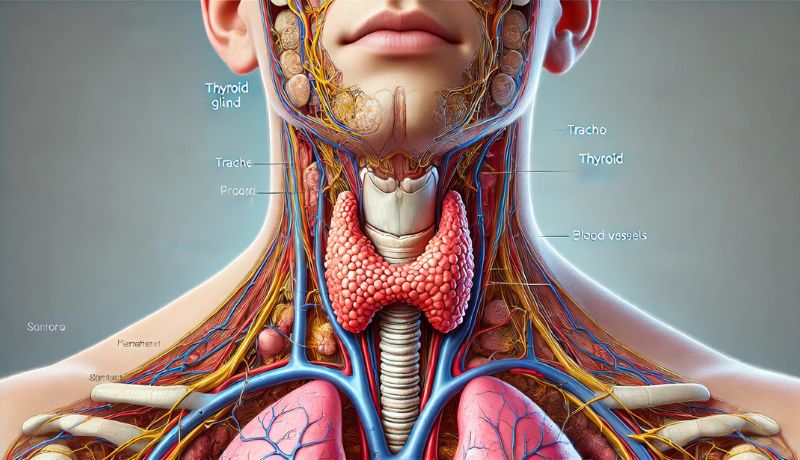
Stress is an inevitable part of life, with short-term stress sometimes offering benefits, but chronic stress significantly endangers our health.
Among these risks is the potential impact stress has on the thyroid gland, an essential part of our endocrine system. Understanding the link between stress and thyroid health is key to improving well-being and preventing potential hormonal imbalances.
How Does Stress Impact the Thyroid?
Most people recognize that stress can affect health in many ways, but the connection between stress and thyroid disorders is less commonly discussed.
The adrenal glands, which are responsible for handling stress, can manage acute stress effectively.
However, chronic stress overburdens these glands, leading to a condition known as adrenal fatigue. When the adrenal glands weaken, it can indirectly affect thyroid function.
Understanding the Thyroid

The thyroid gland is the largest endocrine gland in the body, located in the neck just below the Adam’s apple. It plays a critical role in regulating numerous bodily functions, influencing key organs such as the kidneys, liver, brain, heart, and skin.
A properly functioning thyroid gland produces hormones in precise amounts to keep the body in balance. When the gland produces too much thyroid hormone, the body’s systems accelerate, leading to hyperthyroidism.
Conversely, insufficient hormone production slows the body’s systems, resulting in hypothyroidism. Both conditions can lead to symptoms such as significant weight fluctuations, fatigue, and mood changes.
Stress and Thyroid Connection
One condition linked to stress and the thyroid is referred to as a “thyroid storm” or “thyrotoxic storm,” which occurs when the thyroid becomes overworked due to chronic stress.
Here’s how the process unfolds:
1️⃣ Chronic Stress and Catabolism
When chronic stress persists, the thyroid gland slows down as a protective measure to prevent the body from breaking down too quickly (a process known as catabolism).
This can result in sluggish thyroid function.
2️⃣ Hormonal Cascade
Chronic stress triggers the brain to release corticotropin-releasing hormone (CRH), which signals the pituitary gland to instruct the adrenal glands to produce cortisol, the stress hormone.
Excessive cortisol production disrupts hormonal balance, leading to inflammation and increasing the risk of various health conditions.
3️⃣ Impaired Hormone Conversion
Stress can inhibit the thyroid’s ability to convert the inactive T4 hormone (thyroxine) into the active T3 hormone (triiodothyronine).
This poor conversion exacerbates sluggish thyroid function and increases the likelihood of hypothyroidism.
Restoring Thyroid Health
Chronic stress not only compromises adrenal gland health but also places undue strain on the thyroid. To restore the thyroid gland’s proper function, it is often necessary to first address adrenal health.
This can involve lifestyle changes such as:
📌Stress Management: Practices like meditation, yoga, deep breathing, and regular exercise can help reduce stress levels.
📌Balanced Nutrition: Consuming a diet rich in whole foods, lean proteins, healthy fats, and essential nutrients like selenium and iodine supports both adrenal and thyroid health.
📌Adequate Sleep: Ensuring quality sleep is critical for hormonal regulation and overall well-being.
📌Professional Guidance: Seeking advice from healthcare professionals can help address hormonal imbalances effectively.
Final Thoughts
While stress is not the sole cause of thyroid disorders, it undeniably plays a significant role in many cases.
Chronic stress disrupts the delicate balance of our endocrine system, leading to complications like adrenal fatigue and impaired thyroid function.
By addressing stress and its effects holistically, we can support the health of the thyroid gland and the body as a whole.
Taking proactive steps to manage stress and improve adrenal function is essential. By doing so, we not only safeguard our thyroid health but also enhance our overall quality of life.


Hello,
I suffer from Hypothyroidism, it was diagnosed a year ago when I was pregnant but I had the condition since a lot before but I did not know it until that moment. I have to take a pill every day for the rest of my life but maybe I can make it better reducing the stress from my life.
Hi Paola, I’m glad you mentioned how hypothyroidism and pregnancy are related. It’s a scientific fact that hypothyroidism can affect a woman’s pregnancy. Some women who suffer from this condition have to undergo treatment before their doctor gives them the “green light” to get pregnant. This is another reason why proper stress management is very important because chronic stress can affect our over all well being.
Thanks for weighing in.
See how a person learns something new everyday. My wife has suffered from a terrible amount of stress in the last year and I can honestly say that right now her health scares me. I am going to get her to read this article so that maybe this is something she can get checked. Thank you for opening my eyes to something new.
Hi Dale, thanks for dropping by.
Working in a medical facility has allowed me to see how stress really does cause thyroid problems. The truth is, several of my colleagues were found to be suffering from temporary hypothyroidism resulting from stress. Thankfully, after taking a break from work, their thyroid function got back to normal. Let’s face it, stress is inevitable. However, we need to learn how to properly manage it before it starts affecting the thyroid.
I believe stress is the cause of many things which go wrong in the human body. I remember when I used to let stress run my life, there were days where I could not get out bed.
The thyroid has some very important functions to do for the body, the more people know how to keep it safe, the better. Glad you are talking about it. As I believe cortisol in the body also causes weight gain. If one can control stress, this will help the thyroid, which in turn will keep weight in check.
Great article.
That’s right Jag, stress can cause so many problems to our health. It affects the thyroid which in turn causes the other organs to malfunction. And so I believe we need to raise a greater awareness on this health issue.
Thanks for your comment.